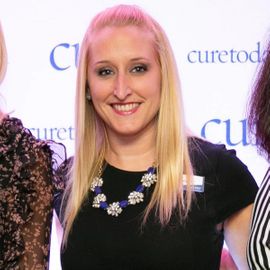- About Us
- Advertise / Support
- Editorial Board
- Contact Us
- CancerNetwork.com
- TargetedOnc.com
- OncLive.com
- OncNursingNews.com
- Terms & Conditions
- Privacy
- Do Not Sell My Information
- Washington My Health My Data
© 2025 MJH Life Sciences™ and CURE - Oncology & Cancer News for Patients & Caregivers. All rights reserved.
Becoming an Informed Patient With Rare Cancer

Kristie L. Kahl is vice president of content at MJH Life Sciences, overseeing CURE®, CancerNetwork®, the journal ONCOLOGY, Targeted Oncology, and Urology Times®. She has been with the company since November 2017.
Dr. Gabriela Hobbs offers insight into a rare cancer, myeloproliferative neoplasms, to help patients learn more during their treatment journey.
Myeloproliferative neoplasms (MPNs) can be difficult to understand, but patients should not feel alone. Many patients with this rare type of cancer are collaborating to not only bring the MPN community together but to also advance treatment options for the disease.
As part of its “Speaking Out” video series, on behalf of the MPN Research Foundation, CURE® spoke with Dr. Gabriela Hobbs, clinical director of leukemia at Massachusetts General Hospital in Boston, about the disease, why patients should be informed, how they can learn more and what they can be hopeful for in the future.
Why is it important for patients to learn more about their treatment options?
That's really important. For a patient with a diagnosis that's rare, I think it's really difficult to feel comfortable with their diagnosis and to feel in control. When (patients receive a diagnosis), there’s a sense of loss of control where something happened that was not something that anybody asks for. I think a part of gaining some of that control is information. I really am a big believer in patients being informed patients, understanding what their disease is ... even being educated in terms of knowing what the name of the disease is.
Thankfully, in the MPN world, there are lots of great foundations (such as the MPN Research Foundation) that can help patients get reliable information. And I think that’s one of the things that’s really difficult about this, the world we live in, where there’s so much information out there. It’s hard sometimes to get reliable information. I (would recommend) going to the MPN Research Foundation, the National Cancer Care Network guidelines, American Cancer Society guidelines — reputable sources (that) are written by reputable people. It is really important to learn about what the (disease is), what trials or treatments exist, what potential complications are, etc. Once you’re an informed patient, you can go to your physician, nurse or whoever is treating you with a set of questions and things that you’ve learned online, and that makes the visit much more productive — even something as simple as saying, “I found the MPN symptom assessment form online, and I have the symptoms; what do you think about that? Am I a candidate for treatment?”
On the flip side of that, I also think that we need to be very careful with what we find online. Some of my patients definitely spend a lot of time on social media. And though I’m somebody who really likes social media (because it) makes us all connected, it can sometimes also have a lot of information that is shared that is anecdotal, meaning it is the experience of only one patient. And although that can certainly bring community to some degree, sometimes the information that’s shared in these groups is just one person’s experience and doesn’t necessarily reflect what a group of large patients may experience. Sometimes I spend a lot of time talking to my patients (telling them that) just because this person had a bad side effect doesn’t mean that (will happen to you). I think we have to be really careful with the information that we get, both in social media and just online in general. Make sure that it’s from a reputable source.
Why should patients be hopeful looking toward future treatment options?
Now is definitely a time to be hopeful. One of the things that I say is that the reason why I was hired to work where I work is because there’s so much understanding about MPNs now that they can hire a person who just treats MPNs. Whereas before, that would have been funny, right? (Before), how do you hire somebody to treat diseases that don’t have any treatments? That’s just one sign of the changing times.
There are lots of clinical trials (evaluating) medications for advanced stages that will, hopefully, get approved in the next couple of years. I feel optimistic about that because I’ll be able to offer more treatments to my patients. Another thing to remember is that in the past decade, our understanding of how these diseases start and progress or evolve over time has really changed exponentially. The amount of people who are doing research on these diseases has increased significantly. And nothing is more proof of that than the fact that there are dozens of clinical trials across the country testing a variety of medications to treat MPNs.
And so, even though when a patient has an MPN they may feel like they’re the only one that has it, remember that you’re not the only one who has it. A lot of people are really thinking about these diseases and trying to improve treatment and improve quality of life for these patients.
For more news on cancer updates, research and education, don’t forget to subscribe to CURE®’s newsletters here.
 Download Issue : Hematology Special Issue (October) 2021
Download Issue : Hematology Special Issue (October) 2021Related Content:




